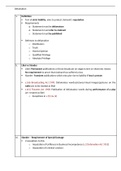Summary
Summary Defamation PQ Notes (First Class)
- Module
- Tort Law
- Institution
- University College London (UCL)
Comprehensive first class Tort Law PQ notes from University College London (2010/2020). Notes include concise case summaries, key reasonings to reconcile conflicting case law and detailed answer outlines to problem questions
[Show more]



